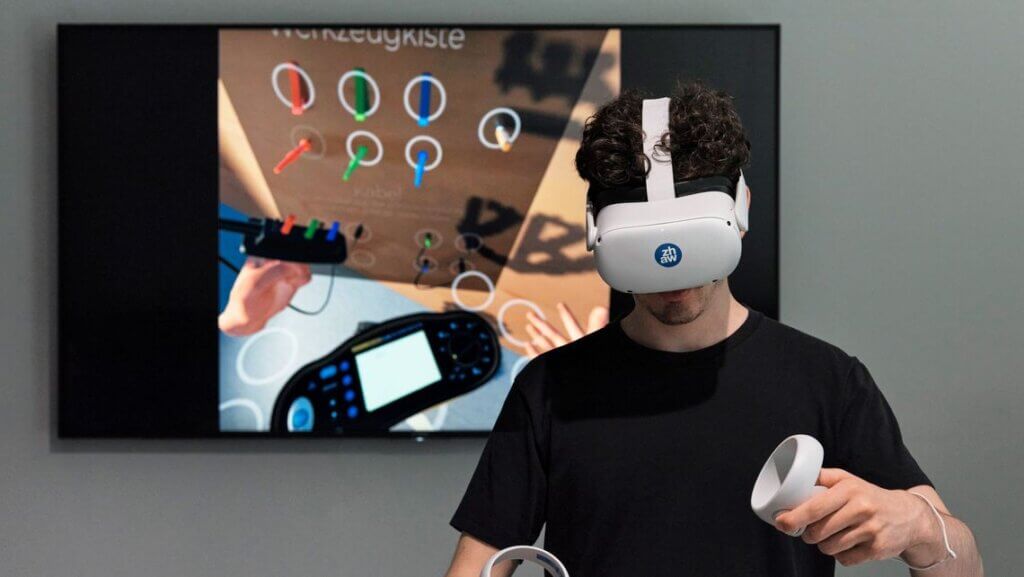Action Competence through Immersive Learning Experiences
Project state
closed
Project start
July 2021
Funding duration
15 months
Universities involved
ZHAW, PHZH
Practice partners
BKW Building Solutions, Bandara, Helvetas, EIT.swiss
Funding amount DIZH
CHF 102'000
For many training companies, it is difficult to provide vocational trainees with sufficient situations in which they can learn and practice the intended professional activities. The stimulation of in-company training with technology-supported worlds of experience on the basis of virtual reality (VR) is therefore promising. However, VR is hardly used systematically in in-company training, which can be attributed, among other things, to a low level of experience and research. Therefore, in a joint project of the ZHAW (Institute for Business Informatics of the School of Management and Law & School of Engineering) and the PH Zurich, a VR learning environment for prospective electricians was developed and tested. The technical expertise was provided by the practical partners Bandara, BKW Building Solutions, the Electrical Education Center Effretikon and the professional association EIT.swiss. In a sub-project, the practice partner Helvetas and the School of Engineering of the Zurich University of Applied Sciences (ZHAW) investigated the potential of using virtual reality (VR) technology with electrical installation trainees at public vocational schools in Tanzania.
Better apprenticeship with virtual reality
A recent study by the ZHAW and PH Zurich shows that virtual learning environments are promising for in-company training. Learners from the electrical industry additionally prepared for their final exams with virtual reality software and were able to improve their grades by one.
One grade better thanks to virtual reality
For the project, ZHAW developed the prototype of a VR learning environment that allows learners to practice testing an electrical installation in a virtual garage using VR goggles. PH Zurich contributed the didactic concept. “We know that learners are often strongly challenged in complex technical processes – whether real or virtual – and depend on structuring guidance. That’s why we enriched the VR simulation with a help and question system as well as game elements to make it an effective VR learning environment,” explains educational scientist Martin Berger from PH Zurich.
In a field study, the performance of 68 Swiss assembly electricians and electricians in their final year of training was compared before and after their exam preparation: 35 learners used virtual reality to prepare for the practical exam, while the other 33 learners prepared using traditional learning methods. It turned out that the assembly electricians in particular benefited from the VR solution. In the final exam, they were able to improve by almost a whole grade compared to the learners without VR. “We were very pleased with the result and it underlines the potential of VR to improve equal opportunities in basic vocational training,” summarizes co-project leader Thomas Keller from the ZHAW School of Management and Law.

Enriching on-the-job training
VR allows learners to learn and experiment with various challenging or even potentially dangerous hands-on activities anytime, anywhere. It is important for those responsible for the study to emphasize that VR should in no way replace practice and contact with instructors. “We see virtual reality solutions as a valuable addition to basic vocational training. The results of the project indicate that didactically sound virtual experience and learning spaces can support in-company learning and, in the process, be effective for building vocational action competencies,” says co-project leader Elke Brucker-Kley from the ZHAW School of Management and Law. The prototype VR learning environment is currently being further developed by the company Bandara for the more than 300 learners of the Bauman-Kölliker Group.
Prof. Dr. Thomas Keller, ZHAW School of Management and Law, Institut für Wirtschaftsinformatik
Elke Brucker-Kley, ZHAW School of Management and Law, Institut für Wirtschaftsinformatik
Dr. Martin Berger, PHZH, Sekundarstufe II Berufsbildung
Dr. Reto Knaack, ZHAW School of Engineering, Abteilung Lehre
Practice partners
Schweizerische Direktorinnen-und Direktorenkonferenz der Berufsfachschulen
Kompetenzzentrum Berufsbildung der BKW Building Solutions AG

Call type: 1. Project Call